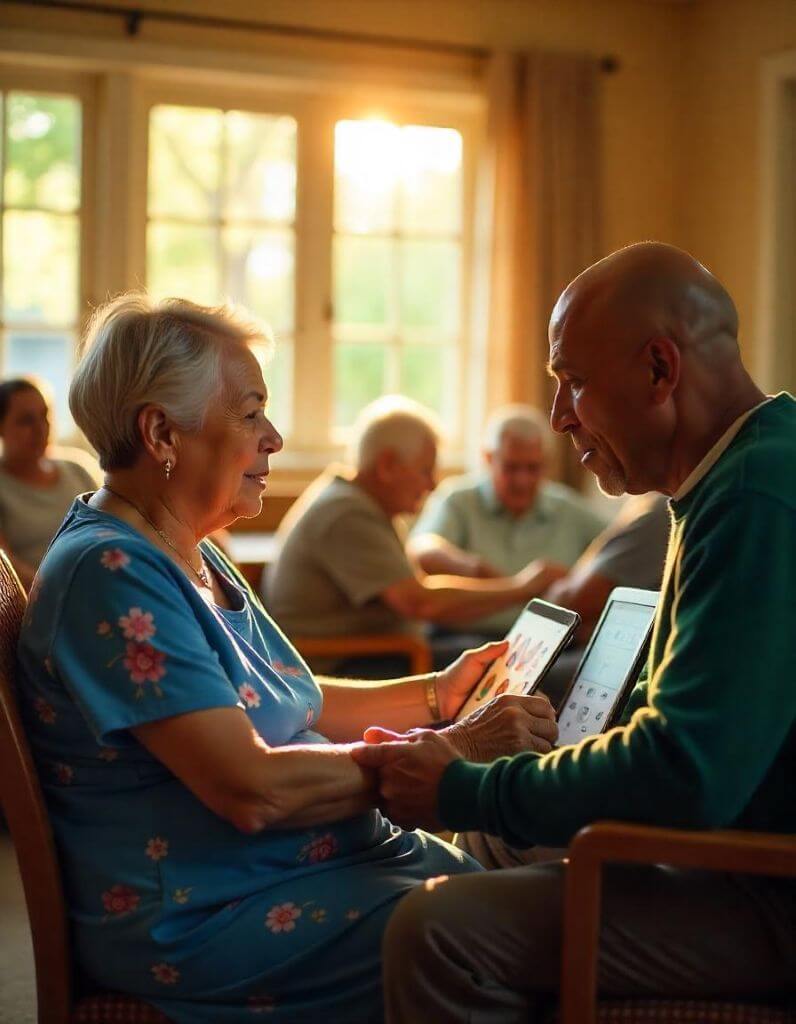Dementia is one of the most challenging conditions faced by aging individuals and their caregivers. It affects memory, cognition, communication startegies, and behavior, often eroding the ability to connect meaningfully with loved ones. The Alzheimer’s Association reports that an estimated 6.7 million Americans aged 65 and older are living with Alzheimer's disease, the most common form of dementia, as of 2023. This number is projected to rise dramatically as the population ages.
Dementia not only steals moments of clarity and understanding from patients but also deeply impacts caregivers, who must adapt to an evolving relationship dynamic and increasing emotional and logistical challenges. Caregiver stress is a well-documented phenomenon, with 30% to 40% of dementia caregivers reporting symptoms of depression, according to studies published by the Family Caregiver Alliance.
The Alzheimer’s Association report also projected that dementia care would cost the US approximately $360 billion in 2024, including direct medical care and unpaid caregiving support by family members. These statistics highlight the far-reaching effects of dementia, not only on those diagnosed but also on their families, health systems, and society at large.
Despite its challenges, dementia care is not insurmountable. With the right strategies, both patients and caregivers can maintain a meaningful quality of life. At the heart of this effort lies effective communication. Understanding how dementia affects individuals and employing adaptive communication strategies—often with the help of technology—can strengthen the caregiver-patient relationship and alleviate some of the daily stressors associated with the condition.
The Impact of Dementia on Patients and Caregivers
Dementia is a progressive condition that affects cognitive functions such as memory, reasoning, language, and problem-solving. For those living with dementia, this often means difficulty recalling recent events, following conversations, or making decisions. Over time, it can also manifest in behavioral changes, such as agitation, confusion, and withdrawal from social interactions.
For caregivers, these changes can be heartbreaking. Watching a loved one struggle with simple tasks or fail to recognize familiar faces is emotionally taxing. Moreover, communication breakdowns can lead to frustration on both sides. Caregivers may feel they are not being understood, while individuals with dementia may feel isolated or judged for their inability to express themselves.
On top of the emotional strain, caregivers often face logistical challenges. Balancing work, personal responsibilities, and caregiving can lead to burnout. Without proper support and strategies, this cycle can create significant stress for families already navigating the complexities of dementia care.
Strategies to Improve Communication and Connection
Despite the barriers dementia creates, communication remains a central pillar of care. Adaptive communication strategies can help caregivers forge stronger connections with their loved ones, reduce misunderstandings, and improve overall quality of life. Below are several approaches to consider.
1. Simplify and Focus
Dementia can make it difficult for individuals to process complex language or multi-step instructions. Caregivers should aim to simplify their communication:
- Use clear, concise language: Instead of saying, “Would you like to go outside or stay in and watch TV?” try, “Do you want to go outside?”
- Focus on one idea at a time: Avoid overwhelming the person with too much information.
Additionally, maintaining eye contact and speaking slowly can help your loved one follow the conversation more easily.
2. Validate Emotions
Regardless of how dementia affects memory or comprehension, emotions remain powerful and intact. A person with dementia may repeat the same concern or express frustration with a situation, even if it’s based on a misunderstanding. Instead of correcting them, validate their feelings.
For example, if they are upset about something that happened years ago, acknowledge their feelings with empathy: “I can see that really upset you. I’m here to help.” This approach helps establish trust and reduces agitation.
3. Leverage Nonverbal Communication
As verbal communication declines, nonverbal cues become increasingly important communication strategies. A warm smile, a reassuring touch on the arm, or gestures like pointing can convey messages without words. Pay attention to their body language as well—restlessness or avoidance can indicate discomfort or confusion.
Harnessing Technology to Overcome Communication Barriers
In today’s digital age, technology offers innovative solutions and communication strategies for enhancing interaction between dementia patients and their caregivers. Below are some tools and communication strategies that can make a difference.
1. Memory Aids and Reminder Tools
Memory loss is one of the hallmark symptoms of dementia, but digital tools can help mitigate its impact. Devices such as smartphones or tablets, equipped with apps like a pill reminder or calendar, can provide visual and auditory cues for daily tasks like taking medication or attending appointments. Smart home assistants (e.g., Amazon Alexa or Google Nest) can also be programmed to give verbal reminders or play familiar music to soothe anxiety.
2. Communication Apps
Several apps are specifically designed as communication startegies for individuals who have dementia. For example, apps like Talking Mats use visual aids to help individuals express their needs and preferences. Additionally, video-calling platforms like Zoom or FaceTime enable long-distance caregivers to stay connected, even when they can't be physically present.
3. Wearable Technology for Safety
Devices like GPS-enabled watches or pendants provide caregivers peace of mind while allowing individuals with dementia to maintain some independence. These tools can track a person’s location and send alerts if they wander outside a designated safe zone. This not only improves safety but also reduces the strain on caregivers who may otherwise feel compelled to monitor their loved ones constantly.
4. Digital Photo Albums and Memory Triggers
Dementia can sometimes disrupt a person's ability to recognize family members or recall cherished memories. Digital photo frames that display a rotating selection of family photos, paired with captions or audio recordings, can serve as memory triggers. Similarly, apps like FamilyAlbum allow caregivers to share photos and videos with the individual, bringing about a feeling of connection regardless of physical distance.
The Importance of Patience and Adaptability
Caring for someone with dementia requires patience and a willingness to adapt. While technology can offer tremendous support, it’s essential to remember that no tool is a substitute for genuine human interaction. Caregivers must remain attuned to the unique needs and preferences of their loved ones, adjusting their strategies as the condition progresses.
Above all, caregivers should prioritize self-care. Seeking emotional support from friends, family, or support groups can provide a much-needed outlet during stressful times. Many organizations, such as the Alzheimer’s Association, offer resources and community programs designed to assist caregivers in navigating these challenges.
Acknowledging the Journey
At LL Medico, we understand that living with dementia is challenging—for both patients and caregivers. While we cannot provide hands-on support, we strive to lessen the burden of caregiving by offering a wide range of top-quality care products at competitive prices.
What’s more, with our Autoship feature, you also need never worry about running out of supplies unexpectedly. Simply schedule regular deliveries for adult diapers, personal care products or over-the-counter medications, and we’ll take care to ensure you have what you need when you need it.
While the road may be difficult, it is also filled with opportunities for growth, connection, and shared moments of joy. With each step forward, caregivers and their loved ones can rewrite the narrative of dementia—not as a story of loss but as a testament to resilience and the enduring power of human connection. As Maya Angelou once said, “People will forget what you said, people will forget what you did, but people will never forget how you made them feel.”






 855-422-4556
855-422-4556 Chat
Chat E-Mail
E-Mail Monday - Friday 9:00AM to 5:00PM EST
Monday - Friday 9:00AM to 5:00PM EST






 Shopping With LL Medico
Shopping With LL Medico



 855-422-4556
855-422-4556